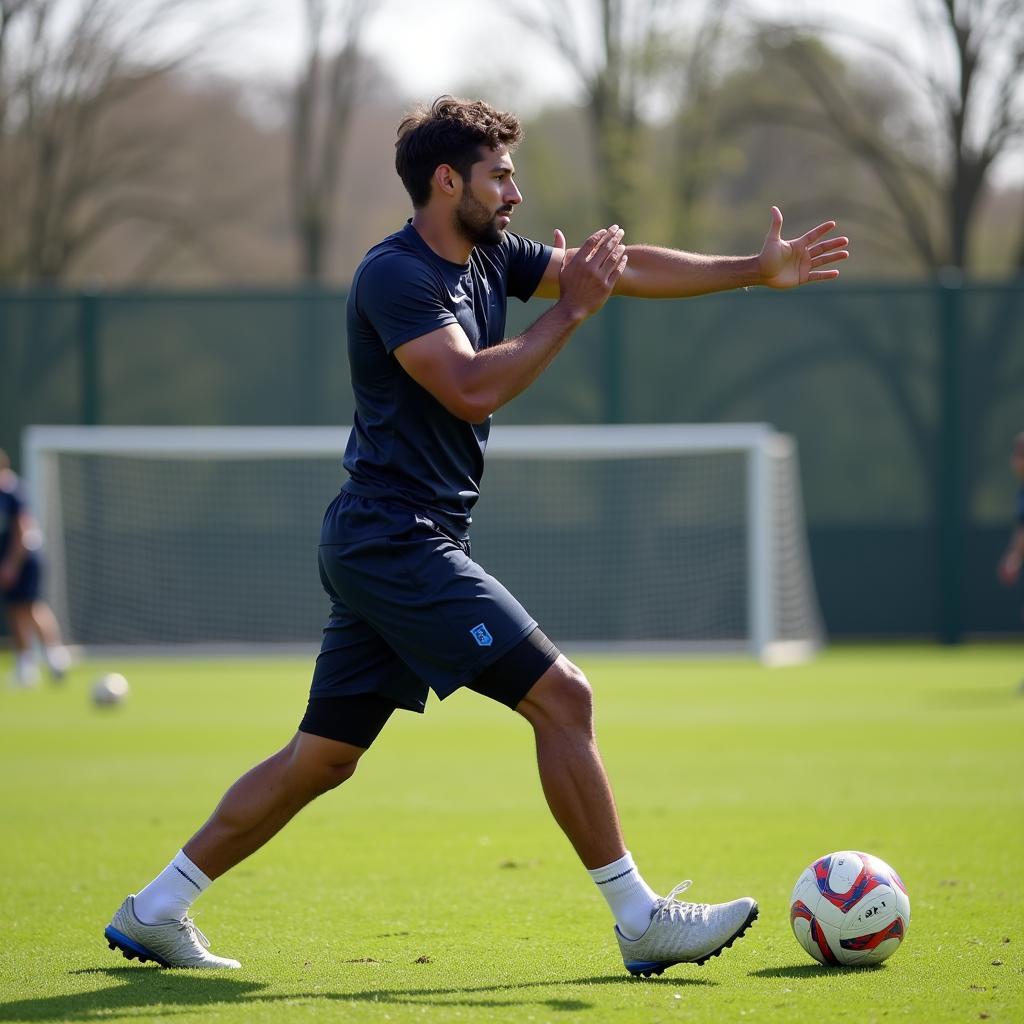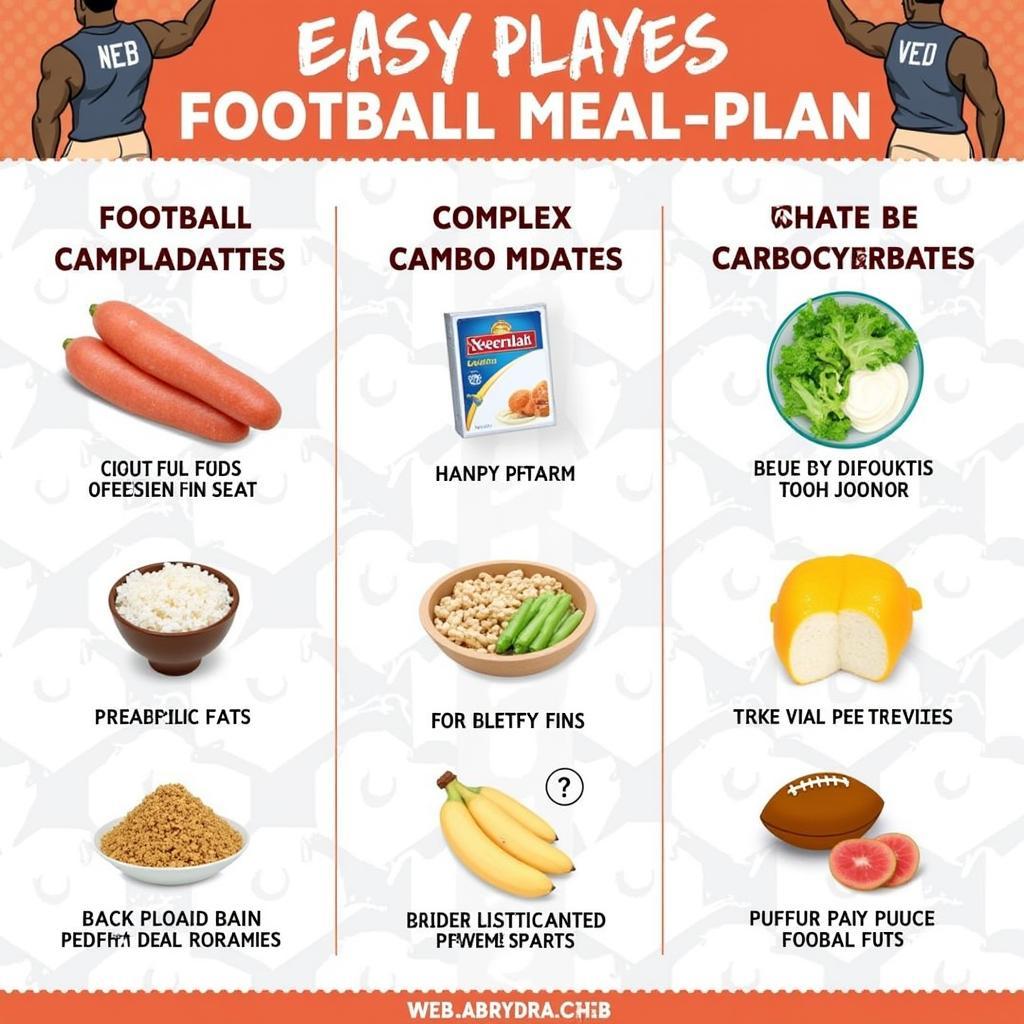Football Player Training Regimen: Unleashing Your Inner Haaland
December 29, 2024As a professional footballer, I know that a dedicated training regimen is the cornerstone of success. It’s what separates the good from the great. Whether you’re a seasoned pro or just starting out, understanding the optimal football player training regimen is key to maximizing your potential. Let’s dive in and explore the secrets to elevating your game.
 Dynamic Stretching Before Training
Dynamic Stretching Before Training
The Pillars of a Winning Football Player Training Regimen
A comprehensive training program encompasses various elements, each playing a crucial role in shaping a well-rounded athlete. These core components work synergistically to enhance performance and minimize the risk of injury. What are they? They are strength training, cardiovascular fitness, flexibility, and nutritional planning. Let’s break down each element.
Strength Training: Building a Powerful Foundation
Building muscle strength is essential for power, speed, and agility on the field. Incorporating exercises like squats, deadlifts, and bench presses builds a solid foundation. Focus on compound movements that engage multiple muscle groups. Remember, progressive overload is key—gradually increasing the weight or resistance to challenge your muscles and promote growth.
 Strength Training for Football Players
Strength Training for Football Players
Cardiovascular Fitness: The Engine of Your Game
Football requires immense stamina and endurance. Regular cardio workouts like interval training, tempo runs, and long-distance runs build your cardiovascular capacity, allowing you to perform at your peak throughout the match. Don’t forget, a strong cardiovascular system allows you to recover faster between bursts of high-intensity activity.
Flexibility and Mobility: Enhancing Performance and Preventing Injuries
Flexibility and mobility are often overlooked, but they are crucial for preventing injuries and optimizing performance. Regular stretching, yoga, and Pilates improve your range of motion, reduce muscle tightness, and enhance agility. This allows you to move freely and efficiently on the field, minimizing the risk of strains and tears.
Nutritional Planning: Fueling Your Body for Success
What you eat plays a vital role in your training and recovery. A balanced diet rich in protein, carbohydrates, and healthy fats provides the fuel your body needs to perform at its best. Stay hydrated by drinking plenty of water throughout the day, especially before, during, and after training sessions.
Sample Weekly Training Schedule
Here’s a glimpse into what a typical week of training might look like:
- Monday: Strength training (lower body focus), followed by light cardio.
- Tuesday: Cardiovascular training (interval sprints), followed by flexibility exercises.
- Wednesday: Recovery day (active recovery like yoga or swimming).
- Thursday: Strength training (upper body focus), followed by plyometrics.
- Friday: Tactical training and skill work.
- Saturday: Match day or high-intensity training.
- Sunday: Rest and recovery.
Remember, this is just a sample schedule. You should adjust it based on your individual needs and training goals. Don’t forget to check out resources like cầu thủ uống trà sữa for recovery tips.
 Nutrition Plan for Football Players
Nutrition Plan for Football Players
What Does a Typical Training Day Look Like?
A typical training day might begin with dynamic stretching followed by strength training or cardiovascular work. This is often followed by skill-specific drills and tactical training. Cooling down with static stretches helps prevent muscle soreness.
How to Optimize Your Football Player Training Regimen?
Optimizing your training involves listening to your body, prioritizing recovery, and constantly adapting your program based on your progress and needs. Remember, consistency is key. Sticking to a well-structured plan over time will yield the best results. Resources like xu hướng tấn công của cầu thủ fo3 can provide valuable insights into tactical training.
Conclusion
A comprehensive football player training regimen requires dedication, discipline, and a deep understanding of your body’s needs. By focusing on strength training, cardiovascular fitness, flexibility, and nutrition, you can unlock your full potential and reach new heights in your football career. So, lace up your boots, hit the field, and embrace the challenge of becoming the best version of yourself.
FAQ
- How often should I train per week?
- What are the best exercises for building strength?
- How can I improve my cardiovascular fitness?
- What should I eat before and after training?
- How can I prevent injuries?
- What type of training shoes should I wear?
- How important is rest and recovery?
Need support? Contact us 24/7: Phone: 0396443476, Email: [email protected] or visit us at 23 Tháng 3, Đắk Nia, Gia Nghĩa, Đắk Nông, Việt Nam.